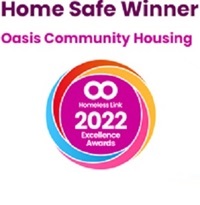History
On 6 August 1984, Aquila Housing Association – as the charity was originally known – was founded by a group of students, mostly Christians, who wanted to do something about the numbers of young people they were seeing living on the streets in Gateshead. They started fundraising in earnest and, after three years, managed to raise enough money to buy a property on Durham Road in Gateshead, which offered a home to five young women at risk of homelessness.
At a similar time, the Oasis Charitable Trust was founded in London by Rev. Steve Chalke MBE who believed God wanted him to provide a hostel, school and hospital for people living in poverty. His No.3 project was already up and running in Peckham and, to this day, continues to support young woman who have nowhere else to go.
In 2014, Aquila merged with Oasis to form the charity we are today: Oasis Community Housing.
Over the past four decades we have opened Elizabeth House, Naomi, Karis and a number of other supported accommodation projects – communal houses and self-contained flats – to help young women, many of whom have babies, get the holistic, round-the-clock support that they need.
In 2011, with growing numbers of people sleeping rough, Oasis Community Housing opened its Basis drop-in in Gateshead; a resource centre offering professional support, showers and signposting to essential services for anyone who walks through the door. A few years later, Basis Sunderland followed; the first of its kind in the city.
In 2019, through close working with the local authority and other homelessness charities, we extended our No.3 project across the London borough of Southwark to support ten times more young people facing homelessness.
When the COVID-19 Lockdown was announced in March 2020, the charity rapidly re-mapped its services to ensure the thousands of people it helps each year were not left vulnerable and unsupported. We were on the frontline of delivering the Government’s Everyone In initiative, which moved 37,000 people who had been rough sleeping into hotels and B&Bs across the UK, and we established a digital inclusion programme to ensure already vulnerable people were not further excluded by social distancing and the national move online.
Today, we support over 1,000 men, women and families in over 150 residences across North East England and South London – and our support for those who need it remains as person-centred, best practice, heartfelt and hopeful as it first started out almost 40 years ago.







